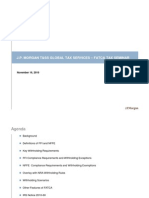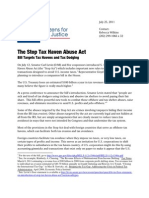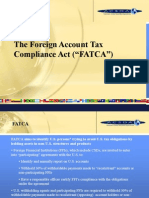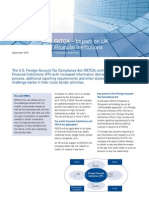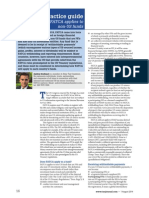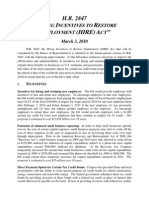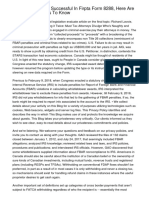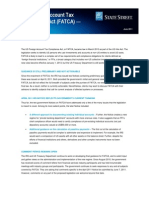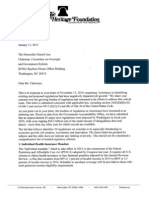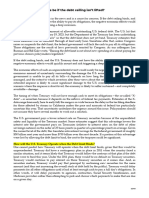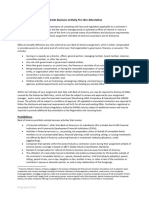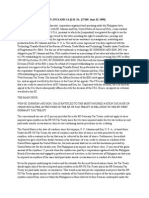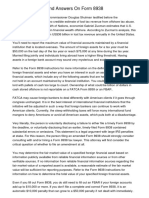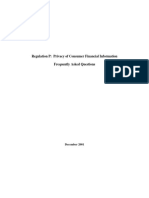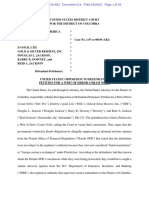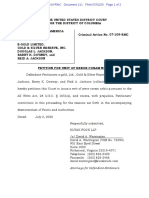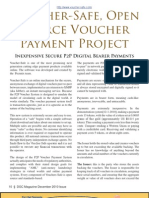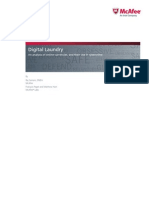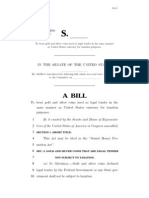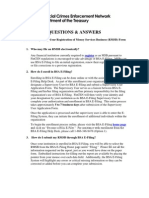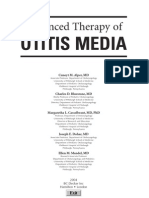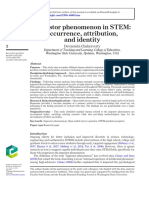Client Briefing Fatca Usa Imposes New Global Withholding and Information Obligations For Non American Financial Institutions 6011359
Client Briefing Fatca Usa Imposes New Global Withholding and Information Obligations For Non American Financial Institutions 6011359
Uploaded by
Carl MullanCopyright:
Available Formats
Client Briefing Fatca Usa Imposes New Global Withholding and Information Obligations For Non American Financial Institutions 6011359
Client Briefing Fatca Usa Imposes New Global Withholding and Information Obligations For Non American Financial Institutions 6011359
Uploaded by
Carl MullanOriginal Title
Copyright
Available Formats
Share this document
Did you find this document useful?
Is this content inappropriate?
Copyright:
Available Formats
Client Briefing Fatca Usa Imposes New Global Withholding and Information Obligations For Non American Financial Institutions 6011359
Client Briefing Fatca Usa Imposes New Global Withholding and Information Obligations For Non American Financial Institutions 6011359
Uploaded by
Carl MullanCopyright:
Available Formats
Client briefing July 2011
FATCA USA imposes new global withholding and information obligations for Non-American financial institutions
The United States has enacted legislation (commonly referred to as "FATCA") that, starting in 2013, will impose new information reporting and withholding requirements with respect to certain holders of "financial accounts" with non-US financial institutions. Under FATCA, non-US financial institutions generally must enter into agreements with the US Internal Revenue Service (the "IRS") to identify financial accounts held by US persons or entities with substantial US ownership, and accounts held by other financial institutions that are not themselves participating in (or otherwise exempt from) the FATCA reporting regime. For these purposes, financial institutions include deposit-taking institutions, persons holding financial assets for the accounts of others, and persons engaged primarily in the business of investing or trading in financial assets or derivatives. If a financial institution does not enter into an IRS agreement (and is not otherwise exempt), FATCA imposes a new 30% US withholding tax on all payments of passive-type income that the financial institution receives from US assets, and on certain payments coming indirectly from US assets as described below. Under the IRS agreement, a participating financial institution must withhold 30% of certain payments it makes to a US accountholder that has not cooperated in the reporting of its account, or to a non-US financial institution without an IRS agreement (and that is not otherwise exempt). The US Treasury Department intends to issue regulations that will treat, for example, interest and principal paid by a participating financial institution as being subject to 30% withholding, but only in proportion to the value of the financial institution's US assets (including US assets held indirectly through other participating financial institutions) as compared to its total assets. The withholding will not, however, apply to debt obligations issued on or before March 18, 2012, and not modified significantly after that date. Under FATCA, a tax treaty will not prevent the withholding of tax. If the withheld tax exceeds the amount of US tax permitted under a tax treaty, the payee can obtain a refund by filing a tax return. However, the payee will not receive interest on the over-withheld tax.
If you would like to know more about the subjects covered in this publication or our services, please contact:
Jos Ignacio Jimnez-Blanco Cristina Prez Carl Fitzgerald To email one of the above, please use firstname.lastname@cliffordchance.com Clifford Chance, Paseo de la Castellana 110, 28046 Madrid, Spain www.cliffordchance.com
Client briefing FATCA USA imposes new global withholding and information obligations for Non-American financial institutions
Accordingly, if a non-US financial institution that has an agreement with the IRS receives a loan from another non-US financial institution after March 18, 2012 (including a draw on a revolving facility concluded before that date), a portion of the principal and interest payments made on such loan after December 31, 2012 will be subject to 30% US withholding unless the payee establishes that it also has an agreement with the IRS, or is otherwise exempt from the FATCA reporting and withholding regime. The market has not yet developed standards for allocating the FATCA risk on loans between non-US financial institutions. However, a standard has developed for syndicated loans to US borrowers under which the lenders assume all risk of FATCA withholding. In the case of loans between non-US institutions there are competing arguments for allocating the risk to the lender or to the borrower. The main arguments for allocating the risk to the lender are (i) the tax has been enacted so there is no change in law; (ii) the lender controls whether it signs an IRS agreement; and (iii) many lenders intend to sign IRS agreements and lenders who choose not to sign IRS agreements will be replaced by those who do. The main arguments for allocating the risk to the borrowers are (x) the loan has no US connection other than the borrower's own direct or indirect US asset holdings; (y) the tax is not mandatory but instead results from the borrower's voluntary agreement with the IRS; and (z) there are large uncertainties regarding the costs and consequences of an IRS agreement that a lender cannot accept as a condition to making the loan. Any US federal tax advice contained in this memorandum is not intended or written to be used, and cannot be used, for the purpose of (i) avoiding penalties under US federal, state or local tax laws or (ii) promoting, marketing or recommending to another party any transaction or matter addressed herein.
This Client briefing does not necessarily deal with every important topic or cover every aspect of the topics with which it deals. It is not designed to provide legal or other advice.
www.cliffordchance.com
Clifford Chance S.L. julio 2011
You might also like
- 3rd Month Performance Appraisal FormDocument4 pages3rd Month Performance Appraisal FormJb BatorniNo ratings yet
- HND Unit 30 TaxationDocument12 pagesHND Unit 30 TaxationzoomNo ratings yet
- IRS Form W-9Document8 pagesIRS Form W-9SAHASec8No ratings yet
- FinCEN Form 105, Currency and Monetary Instrument Report (CMIR)Document2 pagesFinCEN Form 105, Currency and Monetary Instrument Report (CMIR)Carl Mullan100% (1)
- Douglas Jackson Interview 2012 E-GoldDocument8 pagesDouglas Jackson Interview 2012 E-GoldCarl MullanNo ratings yet
- FTC vs. BurnLounge: Case SummaryDocument16 pagesFTC vs. BurnLounge: Case SummaryKevin ThompsonNo ratings yet
- FATCA Article Second Draft2Document9 pagesFATCA Article Second Draft2Anna BouhailNo ratings yet
- Article A Nuisance Called FATCADocument5 pagesArticle A Nuisance Called FATCAvineet_bmNo ratings yet
- US Foreign Account Tax Compliance Act Intergovernmental Agreement Frequently Asked QuestionsDocument11 pagesUS Foreign Account Tax Compliance Act Intergovernmental Agreement Frequently Asked QuestionsKelvin laiNo ratings yet
- Foreign Account Tax Compliance ActDocument69 pagesForeign Account Tax Compliance ActKrishnaNo ratings yet
- Preparing For Fatca Understanding Implications and RequirementsDocument25 pagesPreparing For Fatca Understanding Implications and RequirementsylshihNo ratings yet
- Fatca Help SheetDocument17 pagesFatca Help SheetBen PalmerNo ratings yet
- Corporate Tax USADocument33 pagesCorporate Tax USAHitesh GuptaNo ratings yet
- Prioritizing Your If A Foreigner Nonresident Wins The Powerball Jackpot What US Taxes Are Payable If He Claims The Winnings Via A US Trust For Anonymity To Get The Most Out of Your BusinessbkxjpDocument4 pagesPrioritizing Your If A Foreigner Nonresident Wins The Powerball Jackpot What US Taxes Are Payable If He Claims The Winnings Via A US Trust For Anonymity To Get The Most Out of Your BusinessbkxjpTobin39McManusNo ratings yet
- Fatca - Faq: S Investment ManagementDocument2 pagesFatca - Faq: S Investment ManagementWinnifred AntoinetteNo ratings yet
- FACTA PDF JPMDocument20 pagesFACTA PDF JPMnatashajain4No ratings yet
- KPMG NetherlandsDocument4 pagesKPMG Netherlandsjamie dimaon of jp morgan chase hired tim flynn of kpmg to purvey niggar cok ass rapingNo ratings yet
- The Stop Tax Haven Abuse Act SummaryDocument11 pagesThe Stop Tax Haven Abuse Act SummaryCitizens for Tax Justice100% (1)
- 7) FatcaDocument9 pages7) FatcarajsalgyanNo ratings yet
- Fatca Summary KPMGDocument4 pagesFatca Summary KPMGbharathr873831No ratings yet
- Why and Where To Set Up A Foreign Trust For Asset Protectionffjqr PDFDocument3 pagesWhy and Where To Set Up A Foreign Trust For Asset Protectionffjqr PDFshirticicle02100% (2)
- Practice Guide: How FATCA Applies To non-US FundsDocument3 pagesPractice Guide: How FATCA Applies To non-US Fundsapi-255429187No ratings yet
- What Is FatcaDocument1 pageWhat Is Fatcaraneshkumar1992No ratings yet
- April 2010: Hiring Incentives To Restore Employment (HIRE) ActDocument9 pagesApril 2010: Hiring Incentives To Restore Employment (HIRE) ActSingerLewakNo ratings yet
- Deloitte Fatca Impact Real EstateDocument6 pagesDeloitte Fatca Impact Real EstateJustine991No ratings yet
- US Inbound GuideDocument28 pagesUS Inbound GuideMadoTanNo ratings yet
- HR 2847 FATCA (Hr2847 - ''Hire Act'')Document6 pagesHR 2847 FATCA (Hr2847 - ''Hire Act'')alltheloveintheworldNo ratings yet
- The New Foreign Asset Tax Reporting Rules Impact M&A TransactionsDocument5 pagesThe New Foreign Asset Tax Reporting Rules Impact M&A TransactionsRoger Royse100% (1)
- Fatca and Real Estate Infrastructure FundsDocument4 pagesFatca and Real Estate Infrastructure FundsJustine991No ratings yet
- IRS Maintains FBAR Penalty Data in A Standalone Databasefxxyt PDFDocument3 pagesIRS Maintains FBAR Penalty Data in A Standalone Databasefxxyt PDFratebone2No ratings yet
- Top 5 Questions Regarding Foreign Noncmrkw PDFDocument4 pagesTop 5 Questions Regarding Foreign Noncmrkw PDFproseporch2100% (1)
- Joint Senate Letter On Tax Extenders, May 13 2014Document3 pagesJoint Senate Letter On Tax Extenders, May 13 2014FACT CoalitionNo ratings yet
- TOP Rules Reqs Fact SheetDocument1 pageTOP Rules Reqs Fact SheetStacey BrandnerNo ratings yet
- Request For Taxpayer Identification Number and CertificationDocument4 pagesRequest For Taxpayer Identification Number and CertificationLogan BairdNo ratings yet
- DTTL Tax Unitedstateshighlights 2020Document12 pagesDTTL Tax Unitedstateshighlights 2020Росен Атанасов-ЕжкоNo ratings yet
- Client Bulletin - FATCA 2011.06Document2 pagesClient Bulletin - FATCA 2011.06Jim WolfeNo ratings yet
- Federal Tax System 2015Document32 pagesFederal Tax System 2015Matt GillNo ratings yet
- W9Document4 pagesW9James-heatha GowersNo ratings yet
- An Introduction To Fatca: © The Author (S) 2019 R. Mcgill, Us Withholding Tax, Global Financial MarketsDocument7 pagesAn Introduction To Fatca: © The Author (S) 2019 R. Mcgill, Us Withholding Tax, Global Financial MarketsMukunda HandeNo ratings yet
- Heritage Foundation Letter To Chairman Issa - January 11, 2011Document10 pagesHeritage Foundation Letter To Chairman Issa - January 11, 2011CREWNo ratings yet
- C CCCCCCCCDocument2 pagesC CCCCCCCCapi-118535366No ratings yet
- IRS Form W8Document2 pagesIRS Form W8Benne JamesNo ratings yet
- How Worried Should We Be If The Debt Ceiling Isn't Lifted DocxDocument4 pagesHow Worried Should We Be If The Debt Ceiling Isn't Lifted DocxiamshrimohanNo ratings yet
- Request For Taxpayer Identification Number and CertificationDocument4 pagesRequest For Taxpayer Identification Number and CertificationChristiney Spencer100% (2)
- OBA Pre-Hire Disclosure Document - 5.4.2023Document4 pagesOBA Pre-Hire Disclosure Document - 5.4.2023vladpopabcNo ratings yet
- Reportg6 Soft Copy CreditfinancepracticesDocument10 pagesReportg6 Soft Copy CreditfinancepracticesCEA CardsNo ratings yet
- Cir Vs SC Johnson DigestDocument3 pagesCir Vs SC Johnson DigestMarvin MagaipoNo ratings yet
- FW 9Document4 pagesFW 9api-268381837No ratings yet
- Request For Taxpayer Identification Number and CertificationDocument4 pagesRequest For Taxpayer Identification Number and CertificationJeffery OsbunNo ratings yet
- Foriegn Grantor Trusts - 2010 HIRE ActDocument9 pagesForiegn Grantor Trusts - 2010 HIRE ActGary S. Wolfe100% (3)
- Basic Questions and Answers On Form 8938vkdlq PDFDocument8 pagesBasic Questions and Answers On Form 8938vkdlq PDFdragonhen9No ratings yet
- Do You Have A Foreign Trust To Report To The IrsxhjtuDocument7 pagesDo You Have A Foreign Trust To Report To The Irsxhjtucactusyoke95No ratings yet
- Reg P FAQsDocument32 pagesReg P FAQsEd LakattaNo ratings yet
- AIA Philam Life Policy Owners Consent and Waiver FormDocument1 pageAIA Philam Life Policy Owners Consent and Waiver FormMillard ZNo ratings yet
- The Trump Tax Cut: Your Personal Guide to the New Tax LawFrom EverandThe Trump Tax Cut: Your Personal Guide to the New Tax LawNo ratings yet
- Learning to Love Form 1040: Two Cheers for the Return-Based Mass Income TaxFrom EverandLearning to Love Form 1040: Two Cheers for the Return-Based Mass Income TaxNo ratings yet
- US Taxation of International Startups and Inbound Individuals: For Founders and Executives, Updated for 2023 rulesFrom EverandUS Taxation of International Startups and Inbound Individuals: For Founders and Executives, Updated for 2023 rulesNo ratings yet
- Raising Money – Legally: A Practical Guide to Raising CapitalFrom EverandRaising Money – Legally: A Practical Guide to Raising CapitalRating: 4 out of 5 stars4/5 (1)
- Central Bank Issued Digital CurrencyDocument7 pagesCentral Bank Issued Digital CurrencyCarl Mullan0% (1)
- 2020.09.28 Government Response E-Gold CaseDocument26 pages2020.09.28 Government Response E-Gold CaseCarl MullanNo ratings yet
- DigixGlobal Proof of AssetDocument5 pagesDigixGlobal Proof of AssetCarl MullanNo ratings yet
- Hunter Biden Prescott Police Report 2016Document23 pagesHunter Biden Prescott Police Report 2016Carl MullanNo ratings yet
- Digital Gold Magazine Jan 2016Document49 pagesDigital Gold Magazine Jan 2016Carl MullanNo ratings yet
- PETITION FOR WRIT OF ERROR CORAM NOBIS. Criminal Action No. 07-109Document62 pagesPETITION FOR WRIT OF ERROR CORAM NOBIS. Criminal Action No. 07-109Carl Mullan100% (1)
- Voucher Safe Open Source Voucher Payment ProjectDocument3 pagesVoucher Safe Open Source Voucher Payment ProjectCarl MullanNo ratings yet
- E-Bullion Remission FundDocument3 pagesE-Bullion Remission FundCarl MullanNo ratings yet
- Missouri House Bill No. 1637Document3 pagesMissouri House Bill No. 1637Carl MullanNo ratings yet
- Jon Matonis Interview: DGC Magazine Person of The YearDocument6 pagesJon Matonis Interview: DGC Magazine Person of The YearCarl MullanNo ratings yet
- Digital Laundry An Analysis of Online Currencies, and Their Use in CybercrimeDocument17 pagesDigital Laundry An Analysis of Online Currencies, and Their Use in CybercrimeCarl MullanNo ratings yet
- Kens Artisan Bakery BrochureDocument2 pagesKens Artisan Bakery BrochureCarl MullanNo ratings yet
- Digital Gold Currency Magazine July 2011Document45 pagesDigital Gold Currency Magazine July 2011Carl MullanNo ratings yet
- Sound Money Promotion Act 2011Document2 pagesSound Money Promotion Act 2011Carl MullanNo ratings yet
- Digital Gold Currency Magazine November 2011Document59 pagesDigital Gold Currency Magazine November 2011Carl MullanNo ratings yet
- FAQ Electronically Filing Your Registration of Money Services Business (RMSB) FormDocument3 pagesFAQ Electronically Filing Your Registration of Money Services Business (RMSB) FormCarl MullanNo ratings yet
- Digital Gold Currency Magazine June 2011Document50 pagesDigital Gold Currency Magazine June 2011Carl MullanNo ratings yet
- Silver Viral Project Official GuidebookDocument14 pagesSilver Viral Project Official GuidebookCarl MullanNo ratings yet
- Start MeDocument22 pagesStart MeirmaarmiyahNo ratings yet
- 05 Critical Reading As Looking For Ways of ThinkingDocument43 pages05 Critical Reading As Looking For Ways of ThinkingBryan Callano89% (9)
- Describing PeopleDocument2 pagesDescribing PeopleMihaelaNo ratings yet
- 2003 BensonRPRude ADSDocument10 pages2003 BensonRPRude ADStyas.pawiroredjo1403No ratings yet
- Impostor Phenomenon in STEMDocument19 pagesImpostor Phenomenon in STEMRobertaReinellNo ratings yet
- J. 3 I AsmaDocument10 pagesJ. 3 I AsmaSri WahyuniNo ratings yet
- The Numerical Solution of The Navier-Stokes Equations For An Incompressible FluidDocument4 pagesThe Numerical Solution of The Navier-Stokes Equations For An Incompressible FluidAtul SotiNo ratings yet
- Jntuk 1-1 R16 Q.P Dec 2016Document8 pagesJntuk 1-1 R16 Q.P Dec 2016KoushikNo ratings yet
- Calendar Final PDFDocument352 pagesCalendar Final PDFMohammad VaqqasNo ratings yet
- HOPE 3 2nd Quarter Module 1Document7 pagesHOPE 3 2nd Quarter Module 1Athena Xylitelle L. UlvidoNo ratings yet
- 2018 Study GuideDocument154 pages2018 Study GuideAlainNo ratings yet
- Mapeh3 - Q4 - Week 1Document10 pagesMapeh3 - Q4 - Week 1Virgil Acain GalarioNo ratings yet
- Handout - Character Questions From HotseatingDocument3 pagesHandout - Character Questions From HotseatingJustyna100% (1)
- Esoteric and Exoteric AstrologyDocument6 pagesEsoteric and Exoteric Astrologydvrao_chowdary100% (1)
- Redemption Song Chords by Bob MarleyDocument2 pagesRedemption Song Chords by Bob MarleyKevin CollinsNo ratings yet
- Reading Comprehension Pre TestDocument9 pagesReading Comprehension Pre TestFajar KurniasihNo ratings yet
- Todd May - Foucault's Guide To LivingDocument13 pagesTodd May - Foucault's Guide To LivingoforikoueNo ratings yet
- Recovery CoachingDocument22 pagesRecovery Coachingapi-315973684100% (1)
- Positionality StatementDocument5 pagesPositionality Statementapi-384976039No ratings yet
- Consumer Perception Towards Home Loan PDFDocument62 pagesConsumer Perception Towards Home Loan PDFSujeet Pandit100% (2)
- NetflixDocument2 pagesNetflixGungun JainNo ratings yet
- Kelompok 7 - Bab 8 - MSDM GlobalDocument14 pagesKelompok 7 - Bab 8 - MSDM Globalganjar balko tirosaNo ratings yet
- The Diagnostic Use of ADVIA 2120i Siemens and An "APL Criteria" CanDocument9 pagesThe Diagnostic Use of ADVIA 2120i Siemens and An "APL Criteria" CananggaririnNo ratings yet
- Presupposition AssignmentDocument8 pagesPresupposition Assignmenttahreemsafdar124No ratings yet
- Aluminum Bottle Forming Simulation With AbaqusDocument15 pagesAluminum Bottle Forming Simulation With AbaqusMohamad RezaNo ratings yet
- Technically, A Word Is A Unit of Language That Carries Meaning and Consists of One orDocument7 pagesTechnically, A Word Is A Unit of Language That Carries Meaning and Consists of One orDoni Setiawan sinagaNo ratings yet
- Data ScienceDocument3 pagesData ScienceMarkoPetkovicNo ratings yet















